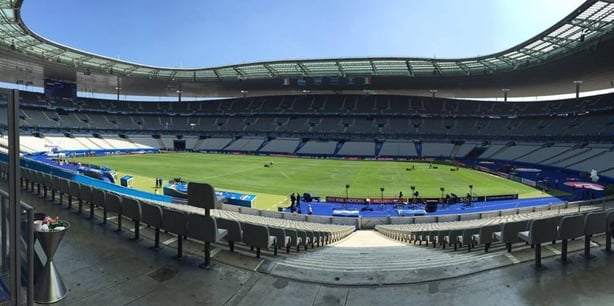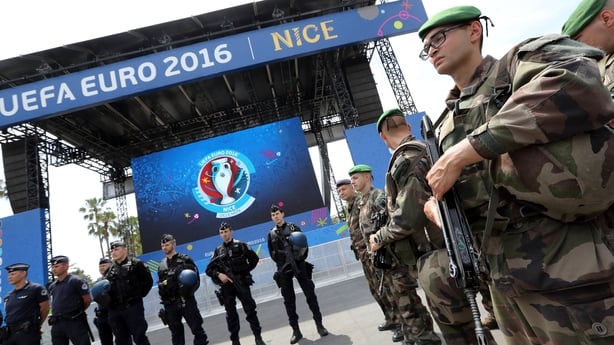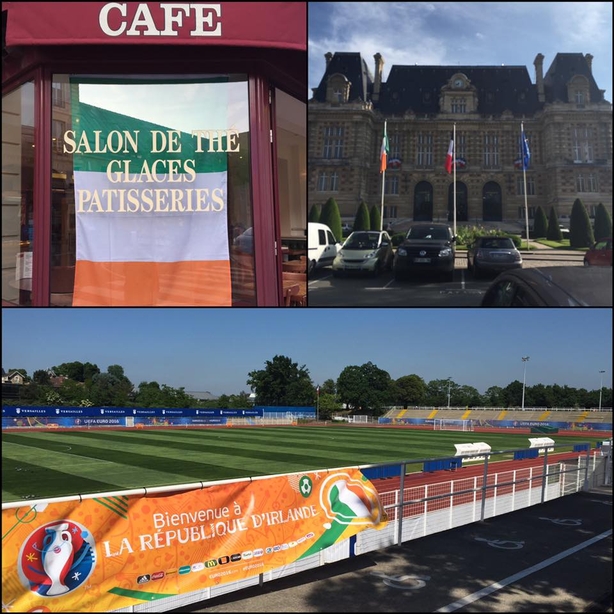Euro 2016 kicks off tonight amid unprecedented security for a sporting event, with almost 100,000 French security forces drafted in to protect fans, players and dignitaries.
The bomb and gun attacks in Paris last November, in which 130 people died, are all too clear in the minds of the French people.
RTÉ's Glenn Mason is in Versailles and has been getting the mood on the ground ahead of the month's footballing fare.
Tonight’s venue for France against Romania, the Stade de France, was the scene of three of those suicide attacks, while the man who planned the atrocity, Abdelhamid Abaaoud, was killed in a follow-up police operation in the suburb of St Denis, not far from the national stadium.
An extra security cordon has been placed around the venue, which also hosts Ireland’s opening game of the tournament against Sweden on Monday, and fans attending games there can be sure to face increased bag checks and security screening.

100,000 fans from Ireland expected in France for Euros
The state of emergency that was introduced by the French government after November’s attacks has been extended to cover this tournament, as well as the Tour de France next month. It grants special powers to detain those suspected of planning attacks, but officials have admitted that it’s not possible to provide 100% protection.
The high state of alert in France follows the airport and metro station attacks in Brussels in March. It has been reinforced by recent warnings from the US State Department and the UK Foreign Office, although it’s believed most of the threats are general in nature rather than specific.
However, the recent arrest in Ukraine of Frenchman Gregoire Moutaux, who was allegedly planning mass attacks at the tournament, shows the constant threat of lone wolf attacks.

There’s a visible military presence in the city’s transport hubs and around the tourist attractions. Well-armed soldiers patrol these sites in groups of twos and threes, sometimes more, such as in Versailles, 20km west of Paris, where the Republic of Ireland team is based. These stern-faced military men look like they’re in no mood for messing about.
The fear of another major terrorist attack, alongside the strike action over labour reforms, which have severely disrupted transport and refuse services, has meant that the tournament vibe so obvious in Poland and Ukraine four years is absent this time around. We’re unlikely to see a repeat of the scenes from Poznan and Gdansk in 2012.
Tens of thousands of Irish fans will arrive here over the weekend with warnings to be vigilant about where they go and how they act. They would also do well to heed the advice of those warning them to leave plenty of time for their journey to the stadium on Monday night. Travelling across Paris is a nightmare at the moment if you’re not familiar with the transport system here.

Train and metro services have been curtailed because of the strike action and many are not running to their designated stops, meaning fans will have to switch trains and lines to reach their destination.
Traffic is also much heavier as more people are driving to get around the railway disruption, so that last-minute dash in the taxi might not be such a good idea this time.
On the pitch, things are looking slightly better for the French, despite the blackmail and subsequent race scandal surrounding former members of the squad, Karim Benzema and Mathieu Valbuena.
He may have lost a few key defenders, but coach Didier Deschamps still has one of the best squads available, which makes them slight favourites ahead of Germany and Spain.
Ireland, meanwhile, are settling in well to their base in Versailles. Jonathan Walters remains the only injury doubt, but Martin O’Neill will give him every chance to prove his fitness when the squad returns to training on Saturday morning.

